上海交通大学:《台湾研究》课程教学资源(英文PPT课件)03 Conditions and Process of Taiwan's Democratization short
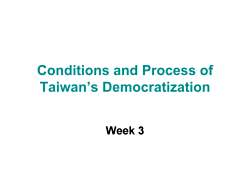
Conditions and Process of Taiwan's Democratization Week 3
Conditions and Process of Taiwan’s Democratization Week 3
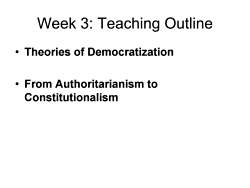
Week 3:Teaching Outline Theories of Democratization From Authoritarianism to Constitutionalism
Week 3: Teaching Outline • Theories of Democratization • From Authoritarianism to Constitutionalism
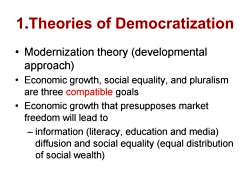
1.Theories of Democratization Modernization theory (developmental approach) Economic growth,social equality,and pluralism are three compatible goals Economic growth that presupposes market freedom will lead to information (literacy,education and media) diffusion and social equality (equal distribution of social wealth)
1.Theories of Democratization • Modernization theory (developmental approach) • Economic growth, social equality, and pluralism are three compatible goals • Economic growth that presupposes market freedom will lead to – information (literacy, education and media) diffusion and social equality (equal distribution of social wealth)
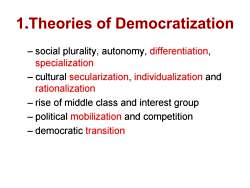
1.Theories of Democratization -social plurality,autonomy,differentiation, specialization cultural secularization,individualization and rationalization -rise of middle class and interest group political mobilization and competition democratic transition
1.Theories of Democratization – social plurality, autonomy, differentiation, specialization – cultural secularization, individualization and rationalization – rise of middle class and interest group – political mobilization and competition – democratic transition
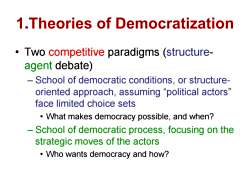
1.Theories of Democratization Two competitive paradigms(structure- agent debate) School of democratic conditions,or structure- oriented approach,assuming "political actors' face limited choice sets What makes democracy possible,and when? -School of democratic process,focusing on the strategic moves of the actors Who wants democracy and how?
1.Theories of Democratization • Two competitive paradigms (structure- agent debate) – School of democratic conditions, or structure- oriented approach, assuming “political actors” face limited choice sets • What makes democracy possible, and when? – School of democratic process, focusing on the strategic moves of the actors • Who wants democracy and how?
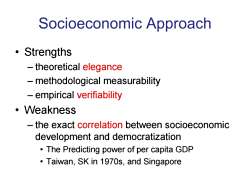
Socioeconomic Approach ·Strengths -theoretical elegance methodological measurability -empirical verifiability ·Veakness the exact correlation between socioeconomic development and democratization The Predicting power of per capita GDP Taiwan,SK in 1970s,and Singapore
Socioeconomic Approach • Strengths – theoretical elegance – methodological measurability – empirical verifiability • Weakness – the exact correlation between socioeconomic development and democratization • The Predicting power of per capita GDP • Taiwan, SK in 1970s, and Singapore
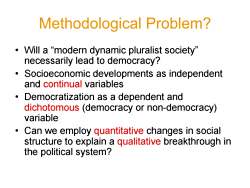
Methodological Problem? ·Wila“modern dynamic pluralist society" necessarily lead to democracy? Socioeconomic developments as independent and continual variables Democratization as a dependent and dichotomous(democracy or non-democracy) variable Can we employ quantitative changes in social structure to explain a qualitative breakthrough in the political system?
Methodological Problem? • Will a “modern dynamic pluralist society” necessarily lead to democracy? • Socioeconomic developments as independent and continual variables • Democratization as a dependent and dichotomous (democracy or non-democracy) variable • Can we employ quantitative changes in social structure to explain a qualitative breakthrough in the political system?
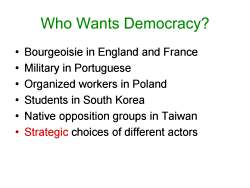
Who Wants Democracy? Bourgeoisie in England and France Military in Portuguese Organized workers in Poland Students in South Korea Native opposition groups in Taiwan Strategic choices of different actors
Who Wants Democracy? • Bourgeoisie in England and France • Military in Portuguese • Organized workers in Poland • Students in South Korea • Native opposition groups in Taiwan • Strategic choices of different actors
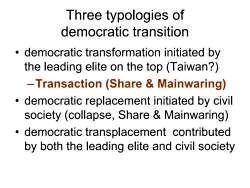
Three typologies of democratic transition democratic transformation initiated by the leading elite on the top (Taiwan?) -Transaction (Share Mainwaring) democratic replacement initiated by civil society (collapse,Share Mainwaring) democratic transplacement contributed by both the leading elite and civil society
Three typologies of democratic transition • democratic transformation initiated by the leading elite on the top (Taiwan?) –Transaction (Share & Mainwaring) • democratic replacement initiated by civil society (collapse, Share & Mainwaring) • democratic transplacement contributed by both the leading elite and civil society
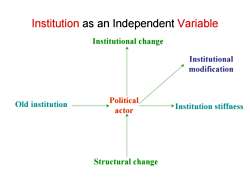
Institution as an Independent Variable Institutional change Institutional modification Old institution Political >Institution stiffness actor Structural change
Institution as an Independent Variable Structural change Old institution Political actor Institutional change Institutional modification Institution stiffness
按次数下载不扣除下载券;
注册用户24小时内重复下载只扣除一次;
顺序:VIP每日次数-->可用次数-->下载券;
- 上海交通大学:《台湾研究》课程教学资源(英文PPT课件)02 Historical Roots of the Taiwan Issue short.ppt
- 上海交通大学:《台湾研究》课程教学资源(英文PPT课件)01 Introduction short.ppt
- 上海交通大学:《当代中国外交》课程教学资源_Lesson 9_问题讨论_lesson 9 问题讨论.docx
- 上海交通大学:《当代中国外交》课程教学资源_Lesson 9_中文阅读材料_结构失衡_中苏同盟破裂的深层原因.pdf
- 上海交通大学:《当代中国外交》课程教学资源_Lesson 9_中文阅读材料_张曙光著_经济冷战_美国对华经济禁运和中苏同盟.pdf
- 上海交通大学:《当代中国外交》课程教学资源_Lesson 9_中文阅读材料_中苏关系破裂原因_研究述评.pdf
- 上海交通大学:《当代中国外交》课程教学资源_Lesson 9_中文阅读材料_50年代末至60年代中苏关系恶化的战略_理论与利益背景.pdf
- 上海交通大学:《当代中国外交》课程教学资源_Lesson 8_问题讨论_lesson 8 问题讨论.docx
- 上海交通大学:《当代中国外交》课程教学资源_Lesson 8_中文阅读材料_中苏在援越抗美问题上的冲突与矛盾_1965_1972_下.pdf
- 上海交通大学:《当代中国外交》课程教学资源_Lesson 8_中文阅读材料_中苏在援越抗美问题上的冲突与矛盾_1965_1972_上.pdf
- 上海交通大学:《当代中国外交》课程教学资源_Lesson 8_中文阅读材料_抗美援朝_与_援越抗美_中国如何应对朝鲜战争和越南战争_章百家.pdf
- 上海交通大学:《当代中国外交》课程教学资源_Lesson 7_问题讨论_lesson 7 问题讨论.docx
- 上海交通大学:《当代中国外交》课程教学资源_Lesson 7_中文阅读材料_难以弥合的裂痕_苏联对中印冲突的立场及中苏分歧公开化_1959_1960.pdf
- 上海交通大学:《当代中国外交》课程教学资源_Lesson 7_中文阅读材料_关于1962年中印边界冲突和中苏分裂研究的若干问题.pdf
- 上海交通大学:《当代中国外交》课程教学资源_Lesson 7_中文阅读材料_中印边界冲突与苏联的反应和政策.pdf
- 上海交通大学:《当代中国外交》课程教学资源_Lesson 7_English materials_中国和印度关于西藏币制改革的交涉及影响 1959——1962.pdf
- 上海交通大学:《当代中国外交》课程教学资源_Lesson 7_English materials_maxwell.pdf
- 上海交通大学:《当代中国外交》课程教学资源_Lesson 7_English materials_jcws.2006.8.3.pdf
- 上海交通大学:《当代中国外交》课程教学资源_Lesson 6_中文阅读材料_美国的政策_英美_特殊关系_与第二次台湾海_省略_机_兼论联盟关系对美国外交决策.pdf
- 上海交通大学:《当代中国外交》课程教学资源_Lesson 6_中文阅读材料_台湾海峡危机_中美关系与亚洲的冷战.pdf
- 上海交通大学:《台湾研究》课程教学资源(英文PPT课件)04 Party Politics in Taiwan short.ppt
- 上海交通大学:《台湾研究》课程教学资源(英文PPT课件)05 Taiwan's Party System short.ppt
- 上海交通大学:《台湾研究》课程教学资源(英文PPT课件)06 Politics of Identity.pptx
- 上海交通大学:《台湾研究》课程教学资源(英文PPT课件)07 Political Interaction across the Taiwan Strait.pptx
- 上海交通大学:《台湾研究》课程教学资源(英文PPT课件)08 Civic Exchange across the Taiwan Strait.ppt
- 上海交通大学:《台湾研究》课程教学资源(英文PPT课件)09-10 U.S.-Taiwan Relations.ppt
- 上海交通大学:《台湾研究》课程教学资源(英文PPT课件)11 Prospects of Cross-Strait Relations short.ppt
- 上海交通大学:《台湾研究》课程教学资源_China's National Identity under Reconstruction.docx
- 上海交通大学:《台湾研究》课程教学资源_Party Politics.docx
- 上海交通大学:《台湾研究》课程教学资源_再论台湾两党体系的可延续.pdf
- 上海交通大学:《台湾研究》课程教学资源(中文PPT课件)03 台湾政治转型的启动.ppt
- 上海交通大学:《台湾研究》课程教学资源(中文PPT课件)04 台湾政治转型的嬗变.ppt
- 上海交通大学:《台湾研究》课程教学资源(中文PPT课件)05 台湾政治转型与涉外关系.ppt
- 上海交通大学:《台湾研究》课程教学资源(中文PPT课件)06 政治转型与美台关系.ppt
- 上海交通大学:《台湾研究》课程教学资源(中文PPT课件)07 台湾政治转型与大陆政策.ppt
- 上海交通大学:《台湾研究》课程教学资源(中文PPT课件)08 台湾政治转型与大陆对台政策.ppt
- 上海交通大学:《台湾研究》课程教学资源(中文PPT课件)09 台湾政治转型与两岸关系.ppt
- 上海交通大学:《台湾研究》课程教学资源(中文PPT课件)10 两岸关系和平发展的前景.ppt
- 上海交通大学:《台湾研究》课程教学资源_阅读材料_2012年台湾选举对政党体系的影响.pdf
- 上海交通大学:《台湾研究》课程教学资源_阅读材料_两岸关系和平发展的机遇和路径.pdf
